Kibaki calls for ‘green economy’

President Kibaki with Unep’s executive director Achim Steiner (right) and the president of Unep Governing Council, Mr Roberto Dobles, during the opening of the 25th Governing Council at Unep headquarters in Gigiri, Nairobi, on Monday. Photo/STEPHEN MUDIARI
What you need to know:
- New global deal will see creation of more jobs and avert disasters related to the climate
Environment ministers from around the world started a meeting in Nairobi on Monday amid calls for a “new global green deal” – an ambitious initiative that would see the creation of more jobs, eradication of poverty while averting climate-related disasters.
The high level meeting, attended by delegates from more than 140 countries at the United Nations Environmental Programme headquarters in Gigiri, comes hot on the heels of the global challenges facing various countries including food shortages and the financial crisis.
New green economy
In Kenya for instance, 10 million people are facing starvation as a result of the post-election violence, poor harvest, low rainfall and the high cost of fertilisers among others.
But on Monday, leaders were unanimous that a new green economy, that would in the long run trigger an employment boom especially in developing countries, was necessary.
And President Kibaki, while officially opening the conference, summed it up; “We need to move towards a green and low carbon economy, for this will deliver multiple benefits and ultimately result in achieving sustainable development that benefits all.”
However, President Kibaki was concerned by continued environmental degradation particularly in Kenya, saying this undermined the fight against poverty and realisation of high economic growth.
“Natural as well as human-induced environmental disasters such as fires, floods, droughts, earthquakes and landslides have become more frequent and continue to cause untold human suffering and economic loss in many parts of the world,” said President Kibaki.
He went on: “To us and the global community, this is a wake-up call to seriously more than ever before, address environmental issues with great vigour in order to enhance and safeguard our environment for the present and future generations.”
President Kibaki said that Kenya, like many other African countries, still faced the challenges of conflicting demands of economic growth and development on one hand and environmental sustainability on the other.
“We as developing countries must however strengthen our resolve to enhance environmental management capacities and the ability of our nations to invest in new and socially acceptable energy sources such as bio-fuels,” he added.
Unep’s executive director Achim Steiner said even as developed countries struggled to contain the effects of the global financial crunch, this should not be done at the expense of the environment.
Financial crisis
“Hundreds of billions of dollars have been mobilised as stimulus packages in response to the financial crisis that have affected various countries. But as we struggle to contain this, we don’t have to put environmental issues on the waiting list,” he said.
Currently, governments worldwide are proposing and implementing $2 to 3 trillion in additional spending over the next one to two years to revive the world’s economy.
Added Mr Steiner: “It is the manner in which such funds are invested that will have a direct bearing on mitigating other environment and development challenges.”
He spoke as environmental experts demanded that a substantial amount of funds be set aside for “greening” the world’s economy.




